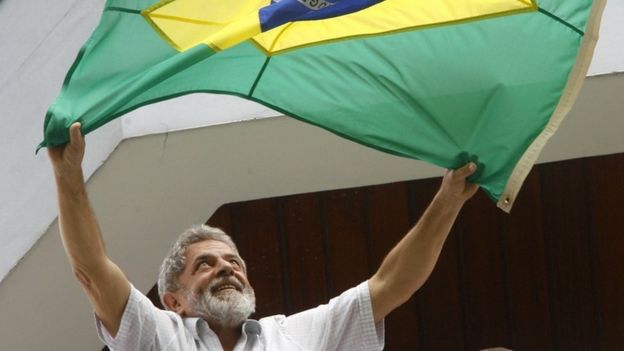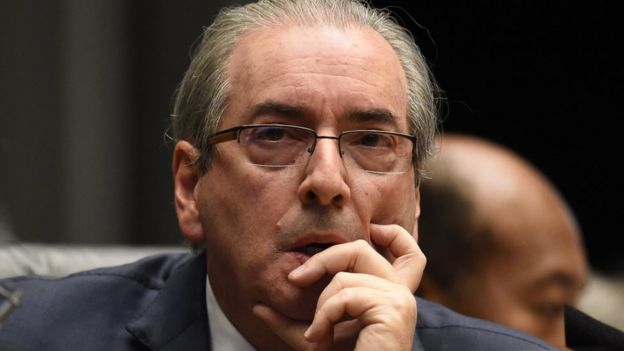
This article is more than
9 year oldYet this 75-year-old law professor may soon become Brazil's next president - and lead the country amid its most serious political and economic crisis in decades - if President Dilma Rousseff loses the battle against impeachment.
Mr Temer is a discreet politician who seems always to be hovering around the centre of everything important, yet never in the spotlight.
But recently Brazil's current vice-president has come out of the shadows to reveal his true colours, as a cunning politician who seems eager to end the Rousseff presidency and begin a new era in Brazil.
Mr Temer's most notable achievement as a politician has been to help the country's biggest political party - the PMDB - form coalitions with every president in the past two decades. He is currently party president.
He presided over Brazil's lower house of Congress during the years of the Fernando Henrique Cardoso government (1995-2002), when Brazil underwent a liberal programme of privatisations and opening-up of the economy.
And under Luiz Inacio Lula da Silva (2002-10, known as Lula) and Ms Rousseff, he has played a key role in helping push forward their Workers' Party agenda of state-led investments.
But rather like his party, which has not held outright power for over two decades, Mr Temer has always been a kingmaker, but never king.
Both party and man avoid clear ideological positions, which leaves them in a comfortable position for negotiating their participation in coalitions of any political colour.
As Brazil's political crisis worsened and Ms Rousseff's Workers' Party bore most of the brunt for the many scandals in the country, the PMDB saw an opportunity to finally seize power.
For most of last year, as Ms Rousseff's situation deteriorated, Mr Temer kept a low profile.

But in December, things began to change.
The speaker of Brazil's lower house of Congress, Eduardo Cunha, also a PMDB politician, opened impeachment proceedings against Ms Rousseff for allegedly doctoring government public finances - an allegation the president denies.
A few days later, a bitter letter written by Mr Temer to Ms Rousseff was leaked to the press, in which he complained that he had been neglected in making key decisions in the coalition.
In March, the PMDB officially abandoned the coalition.
This month, the battle between Mr Temer and Ms Rousseff for Brazil's top job finally came out into the open.
Two weeks ago, Mr Temer sent a WhatsApp recording to a few MPs with a draft of the speech he had prepared in case Ms Rousseff lost Sunday's impeachment vote, in which he outlined how Brazil needed a "government to save the country".
Mr Temer said the message was sent by mistake, but Ms Rousseff accused him of deliberately releasing his speech.
Furthermore she accused both Mr Temer and Mr Cunha of being "chief and vice-chief of a coup" against her.
Both men denied they are conspiring for Brazil's top job.
In the days leading to Sunday's vote, both Mr Temer and Ms Rousseff met dozens of MPs, with some accounts of tough negotiations of jobs and promises in exchange for votes in Congress f-rom both sides.
So what could Brazilians expect if Mr Temer became president?
In October 2015, the PMDB launched a manifesto called Bridge to the Future, which outlined what policies they would defend within the coalition.
Most policies are popular with businesspeople and investors and would go a lot deeper into rebalancing Brazil's budget than President Rousseff has done so far - such as creating a minimum age for retirement, changing the scope of social programmes, opening up the oil sector, making labour laws more flexible and cutting mandatory spending in health and education.
However, many of those policies are likely to find a lot of resistance.
"It is the type of programme that even a government that was elected by the people with total legitimacy f-rom the vote would have a very hard time approving in the middle of such a big crisis," says economist Laura Carvalho, f-rom USP university.
"They will try to push that through and there's going to be a lot of resistance f-rom social movements and labour uni-ons."
Mr Temer has signalled he may approach the opposition PSDB party to secure a majority in Congress - but that would be a hard sell for many, as the majority of Brazilians rejected the party in the 2014 elections.
There are also questions of how Mr Temer would handle corruption investigations, as his party features prominently in many scandals, including the speakers of both houses of Congress - Mr Cunha (Lower House) and Renan Calheiros (Senate).

So far Ms Rousseff has refrained f-rom intervening in the Federal Police and court investigations into alleged corruption at state oil firm Petrobras - even when the scandal caused serious damage to her party.
Would Mr Temer do the same?
The vice-president himself is not under direct investigation, but Mr Cunha - a powerful ally who has led much of the impeachment process that may benefit Mr Temer in the end - is alleged to hold millions of dollars in Swiss bank accounts. Mr Cunha denies all allegations.
There is a public outcry against Mr Cunha, so Mr Temer will be under pressure to turn against him and keep investigations independent.
During many occasions throughout the current crisis, Ms Rousseff has stressed that she was elected by 54.5 million Brazilians in 2014 and therefore has legitimacy to lead the country.
As her vice-president, Mr Temer indirectly received the same votes.
If he ascends to power, he will lead the whole nation - even those who don't even know who he is.
